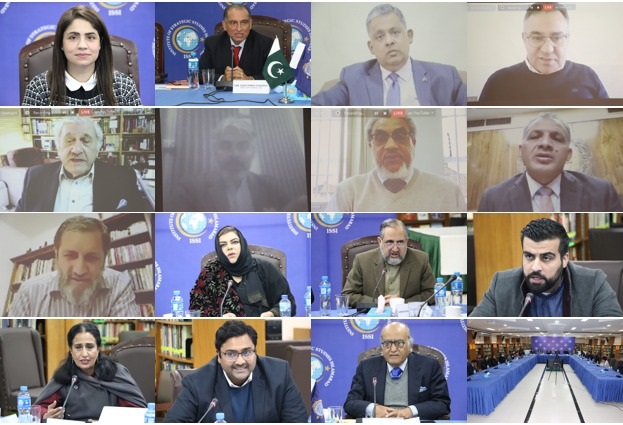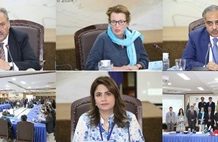Press Release
In-House meeting
OIC & Afghanistan
December 21, 2021

The Centre for Afghanistan, Middle East & Africa (CAMEA) at the Institute of Strategic Studies Islamabad (ISSI) held a special In-House meeting on “OIC and Afghanistan” on December 21, 2021. The distinguished speakers included: Ambassador Aizaz Ahmad Chaudhry, Director General ISSI, Ambassador Khalid Mahmood, Chairman BOG, ISSI, Ambassador Rizwan Saeed Sheikh, Pakistan’s Permanent Representative to the OIC, Dr Murat Aslan, SETA Security Researcher and Faculty Member at Istanbul Sabahattin Zaim University, Mr Sabah Al-Mukhtar, Partner at Arab Lawyers Network, Dr Sibghatullah Ghaznavi, former Deputy Minister of Municipalities at the Independent Directorate of Local Governance (IDLG), Senator Sehar Kamran, Patron in Chief, Centre for Pakistan & Gulf Studies (CPGS), Ambassador Abrar Hussain, former Pakistan Ambassador to Afghanistan, Dr Daud Abdullah, Director Middle East Monitor (MEMO), UK, Dr Fayez Farahat, Director of Al-Ahram Center for Political and Strategic Studies, Mr Hashmat Moslish, Independent Political Analyst with special focus on Afghanistan, Ambassador Naela Chohan, former Pakistan Diplomat, Dr Nazir Hussain, Professor and Dean Social Sciences and Humanities at University of Wah, Mr Ahmad Shah Durrani, author of ‘An Outside the Box Look at Afghanistan: New Ideas for Lasting Peace and Stability’, Dr Qandeel Abbas, Associate Professor, Quaid-e-Azam University, Islamabad, Mr Hashim Pashtun, Advisor for Research Analysis at the Kabul Institute for Peace and Dr Adil.
During her introductory remarks, Ms. Amina Khan, Director CAMEA stated that Pakistan has been a staunch advocate of a peaceful solution to the conflict which has revolved around a negotiated settlement with the Taliban. Pakistan has been at the forefront to avert a humanitarian crisis in Afghanistan, and has made repeated calls to the international community not to ‘abandon’ the people of Afghanistan, provide humanitarian and economic assistance and engage with the political dispensation in Afghanistan to avert a collapse of the state. While the OIC meeting is a much needed step in the right direction, and certainly reassuring, it is going to take much more to ensure that some semblance of stability returns to Afghanistan, where it can have a functioning economy. Hence in such dire circumstances, it is important for the international community to move away from politics, remain engaged with the Taliban by providing much needed humanitarian aid and economic assistance and push towards a consolidated effort to ensure that Afghanistan does not collapse into a humanitarian disaster.
During his welcome remarks, Ambassador Aizaz Ahmad Chaudhry, was of the view that the special In-House session was a timely event after the OIC Ministerial meet. On the OIC moot he said this was a step in the right direction and was a powerful call. Without removal of sanctions we cannot see expeditious relief for the Afghan populace and it is not only Afghanistan which will suffer but the entire world and most importantly whole region will suffer which is why politics should be kept aside, he said.
Ambassador Rizwan Saeed Sheikh said that the OIC moot was a huge success. OIC is in a unique position to provide and assist in averting the humanitarian crisis in Afghanistan. He also mentioned that humanitarian assistance is a dire need but the economy of the country needs to be stabilized in order to see a peaceful and prosperous Afghanistan. He stressed that it is an important moment where we have to translate the words into actions. Moreover, speedy transmission of humanitarian assistance is need of the hour and it must be ensured and OIC is best placed to provide a unique platform because of its unique position.
Dr. Murat Aslan said that the humanitarian crisis in Afghanistan has become an imminent threat to the country and it is one of the most dangerous threats. At this stage we have to think about the other avenues as well in order to see the peaceful and prosperous Afghanistan which is based on a stable economy, judiciary and political setup. There must be some type of reconstruction and transformation. This process is not easy and requires technical skills. Taliban should direct an action plan to satisfy the expectation of the public and assess what is required to achieve this plan. He mentioned four things that are important to analyze to understand the future of Afghanistan, first how the Taliban will rule the country, second public perception about the Taliban, third, their plans regarding the development of the country and last but not least the regional approach towards Afghanistan.
Mr. Sabah Al-Mukhtar in his remarks said that Arab countries have no united policy or stance in international matters. He remarked that the official line is heavily influenced by western views and policies. He said that there is a general belief that people of Afghanistan should have the right to live their lives according to their culture and cultures cannot be changed with force. He further said that the UN should realize that nations and people have rights. He concluded by saying that this humanitarian disaster is not natural but a man made one caused by policies.
Dr. Sibghatullah Ghaznavi thanked Pakistan for organizing OIC at such a critical time. He said that the current situation in Afghanistan is a human made disaster and can only be prevented by human efforts. In Short term, he said, one is narrative inside and the other outside of Afghanistan post 15 August that needs to change and that certain elements of the Doha agreement need to come to light. He said that Community councils and trust mechanisms are important and can be utilized for distribution of humanitarian assistance in Afghanistan because the UN is only a good mechanism in situations where there is no crisis. In long term he said that any happening in Afghanistan has direct implication on the entire region so it is high time that current regime in Afghanistan should make coordinated effort to deal with the ground situation and region at large.
Senator Sehar Kamran outlined the devastating humanitarian crisis in Afghanistan. These are just not statistics, but the lives of millions of human beings. The silence by the international community on the humanitarian situation in Afghanistan is alarming. Almost 75 percent of Afghanistan’s budget depends on external funds. Pakistan being the next door neighbor of Afghanistan has the most stakes in the region. Pakistan cannot afford an unstable Afghanistan. Any stubbornness in the behavior of the international community will only increase the suffering of the Afghan populace. The Taliban should realize they cannot operate in isolation. This OIC conference is just the beginning. It is now important that a diligent follow up is done on the recommendations of the OIC moot, she said.
Ambassador Abrar Hussain was of the view that the OIC summit was a timely initiative. He said that some of the concrete decisions were taken during the summit. However, it is time to turn the words into action. He mentioned that only Saudi Arabia has pledged one billion riyals and others have to pledge as well. He remarked how this aid will reach the people of Afghanistan and to what extent it is possible to sideline the Afghan government is the question of critical importance. Furthermore, how OIC will play a role in averting a humanitarian crisis.
Ambassador Naila Chohan said that we should commend the efforts of the OIC as tangible resolutions were made in the meeting. She further said that the OIC needs to negotiate with the UN.
Dr Daud Abdullah said that the OIC has an opportunity to demonstrate the purpose of its founding and that it is not ordinary as its principles and identity is different from other international organizations. He further said that there is no justification for Muslim countries to support sanctions in Afghanistan and that 35 million Afghans should not be made to suffer for the mistakes made by the governments. Historically, he said, sanctions have not done well for any state’s people and by imposing sanctions on the Taliban are misguided in this regard. Therefore, he remarked, the OIC must adopt an approach which is different. OIC must think differently vis a vis its policy options on Afghanistan and use its influence with the international community to stabilize Afghanistan. A cooperative will of the authorities is needed to avoid the humanitarian catastrophe in the country. There must be a mechanism that ensures that the pledges are delivered to not just Kabul but across Afghanistan. OIC is at the best position to ensure stability in Afghanistan, he said.
Dr. Fayez Farahat was of the view that OIC should reconsider its approach towards Afghanistan. He also said that we should understand that the Taliban are the de facto government and there is no other option in Afghanistan. Security of South Asia and Afghanistan is interlinked and we cannot eliminate the Middle East from it. Islamic world has a role to play in changing Taliban perception towards the world. He stressed that China and Russia have their own political and economic interests in Afghanistan. No other approach can help Taliban to sustain their rule in the country hence OIC is very important in this regard. He said that the matter of recognition is an important card and it should be used in an effective manner by OIC and it should go for the popular decision.
Mr Hashmat Moslish said that in the past twenty years, the US has lost the opportunity of developing Afghanistan. The collapse of the economy is not the result of Taliban policies but it was the US failure. At this stage it is important for the Taliban to make a mechanism and they should take control of the resources of the country and make a policy to run and govern their country. The US and its allies did not allow a viable democratic system. Firstly, they called the warlords as Mujahideens and then signed a deal with them. Taliban are the only viable political entity in Afghanistan. The Taliban officials should stop looking towards the USA.
Mr. Hashim Pashtun was of the view that the world has realized that Afghanistan is at the brink of the humanitarian crisis but now there is a need for action because we are already getting too late. He said, OIC is a good step in this regard.it has a major role to play in bringing peace and stability in the country. He also suggested that a diverse committee should be created to deal with the crisis in Afghanistan.
Ambassador Khalid Mahmood in his concluding remarks stated that the OIC summit was a timely initiative. The organization is ideally situated to deal with the crisis which people of Afghanistan are facing now. He mentioned that this conference has sensitized the international public opinion. Previously the west was talking about the issue but now with this event it has come to the public domain as well. He highlighted that pledges are only made by KSA and other countries should also come forward and pledge some funds and assistance. He said that the issue of sanctions is also of critical importance and they are used as a tool to harm the innocent people and the most vulnerable segment of the society. If they cannot be removed they must be limited, he concluded.











